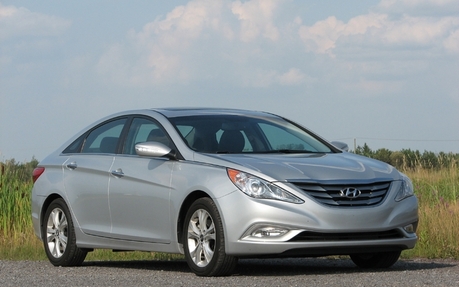2011 Hyundai Sonata: A cut above the rest
Ever since the day it launched, the Hyundai Sonata was destined for success. With a slender physique, seductive price and greatly improved quality of manufacturing, the Sonata could look forward to a promising career. And today, regardless of what version you choose, the Sonata is an appealing product that stands out ahead of the competition. Sure, the Mercedes CLS, Volkwagen Passat CC and the new Audi A7 are similar to the Sonata, but they aren’t nearly as affordable. I couldn’t wait to get behind the wheel of this new Hyundai.
Daring design
The automotive landscape seems to have fewer and fewer traditionally shaped sedans, especially if you’re looking at new products from the big-name designers. Instead, a lot of four-doors have adopted a sport coupe style. The Hyundai Sonata is the first to offer this look among the intermediate sedans under $30,000. The competition still bears the traditional style with a vertical rear window and the trunk dipping below horizontal. And yet, despite its swooping roof, the Sonata offers enough head clearance in the back, and the trunk opening is quite decent.
Classy interior
The interior of the Sonata is congruent with its exterior. The design is innovative and refreshing, the presentation is extremely ergonomic and the layout of the materials is excellent. Adequate comfort from the seats, with good side support to make you feel safe, even when you’re doing slalom manoeuvres. As with the Mazda 6, the driving position is a little too high for taller folks. The seat doesn’t drop low enough, which means your head brushes a little too close to the junction between the roof and the windshield. Accessing the rear seats is easy, despite the plunging roof line, and there’s enough space even for larger adults.
Surprisingly good 4 cylinders
As soon as you get behind the wheel, you notice that the car is equipped with a four-cylinder engine. You can hear these four cylinders work, despite the Sonata’s great soundproofing. Even though a V6 is largely pointless in a car of this type, it would make the drive a little smoother and offer exemplary stability (like on the Genesis). However, the four-cylinder is perfectly justifiable when you consider fuel consumption. Paired with an automatic six-speed transmission, the engine works splendidly, and gear shifts remain discreet without taking the revs to extremes. The Sonata’s fluid design also limits wind noise. On the highway, you truly feel as though you’re cutting through the air. The excellent Dimension sound system completes the driving experience, which, oddly enough, is quite similar to what you get from a Mercedes C-Class.
Smooth ride guaranteed
Take the Sonata out for a drive, and you’ll see that it is both solid and pleasant to drive. The model we tested, the Sonata Limited, comes with several elements that contribute to road handling while inspiring a sense of safety and comfort. In addition to the car’s great soundproofing, the tires have a great grip on the asphalt. The Sonata reacts swimmingly in slalom situations, and roll is kept under control by the suspension. You have to get used to the steering, which is a little too assisted at high speeds and too heavy at low speeds. The brakes are disconcertingly effective, but after a few good stops, they lose a little punch. At highway speeds, the Sonata stays the course with ease and shows no indication of veering off at the slightest nudge of the steering wheel (unlike other vehicles, including some that come at a much heftier price).
Fuel consumption above all else
In normal driving conditions, the Sonata achieves a very acceptable fuel consumption rate. We observed 8.2 litres per 100 km. These results are definitely due to the four-cylinder engine. This means forgetting about lightening-fast accelerations and instantaneous pick-up. But contrary to popular belief, the juice you get from a four-cylinder these days (including the one in the Sonata) is close to rivalling certain V6s. For example, the Sonata’s four-cylinder engine (198 hp) delivers more power than the Chrysler Sebring’s V6 (189 hp) and nearly as much as the Chevrolet Impala’s V6 (207 hp). While a V6 may offer a smoother ride, it will also suck back a lot more gas, which means you pollute more and you spend more. Essentially, there would be no point in offering the Sonata with a V6. This car does very well with its four-cylinder engine.
Hyundai has created an excellent car. It stands out from the Toyota Camry, Honda Accord and Mazda 6 with a modern design and exemplary fit and trim. Plus, the Sonata is one of the best deals on the market right now. It boasts a great price and is worthy of endless praise.
| Test drive report | |
| Test model | 2011 Hyundai Sonata |
|---|---|
| Trim level | Limited |
| Price range | $22,649 – $30,999 |
| Price as tested | CA$28,999 |
| Warranty (basic) | 5 years/100,000 km |
| Warranty (powertrain) | 5 years/100,000 km |
| Fuel economy (city/highway/observed) | 9.4 / 5.7 / 8.2 L/100km |
| Options | None |
| Competitive models | Chrysler Sebring, Honda Accord, Mitsubishi Galant, Nissan Altima, Dodge Avenger, Subaru Legacy, Toyota Camry, Volkswagen Passat CC, Mazda Mazda6, Ford Fusion, Suzuki Kizashi, Buick LaCrosse, Kia Optima, Chrysler 200, Kia Magentis, Chevrolet Malibu |
| Strong points |
|
| Weak points |
|
| Editor's rating | |
| Fuel economy | |
| Value | |
| Styling | |
| Comfort | |
| Performance | |
| Overall | |
